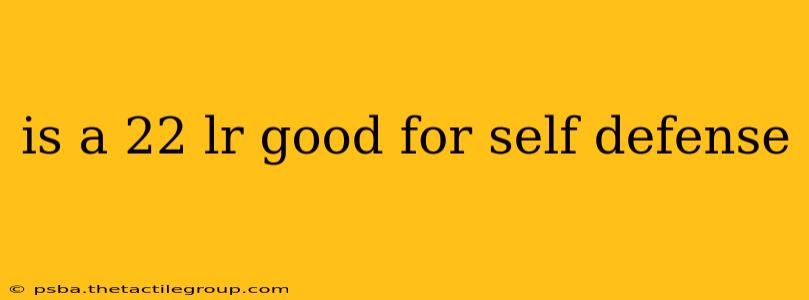Is a .22 LR Good for Self-Defense? A Comprehensive Look
The question of whether a .22 LR is suitable for self-defense is complex and sparks considerable debate among firearms enthusiasts and experts. There's no simple yes or no answer; the effectiveness depends on several crucial factors. Let's delve into the pros and cons to help you form your own informed opinion.
The .22 LR: Advantages and Disadvantages in Self-Defense
Advantages:
- High Capacity: .22 LR pistols and rifles often boast high magazine capacities, allowing for more shots in a self-defense situation. This can be crucial if facing multiple attackers or if initial shots miss.
- Lightweight and Easy to Handle: The small caliber and lightweight nature of .22 LR firearms make them easier to handle, especially for smaller individuals or those with less upper body strength. This can translate to quicker target acquisition and better control during stressful encounters.
- Quieter Operation: Compared to larger calibers, .22 LR rounds are significantly quieter, which could be advantageous in close-quarters situations where excessive noise might draw unwanted attention or compromise hearing protection.
- Cost-Effective: .22 LR ammunition is considerably cheaper than larger calibers, allowing for more frequent practice and range time, crucial for honing self-defense skills.
- Reduced Recoil: The lower recoil of .22 LR makes it easier to control, leading to faster follow-up shots and increased accuracy, particularly for beginners.
Disadvantages:
- Limited Stopping Power: This is arguably the most significant drawback. The relatively low energy and small bullet diameter of .22 LR ammunition often lack the stopping power necessary to instantly incapacitate an attacker. Multiple well-placed shots may be required, which can be challenging in a high-stress self-defense situation.
- Penetration Limitations: .22 LR rounds may not penetrate sufficiently through barriers like clothing or car doors, reducing their effectiveness in certain scenarios.
- Accuracy Challenges at Distance: The small bullet is more susceptible to wind drift and trajectory deviations, making accurate shots at longer ranges difficult.
- Ethical Considerations: The lower stopping power raises ethical concerns; using a .22 LR for self-defense increases the chance of the attacker remaining mobile and potentially continuing the assault, putting the defender at greater risk.
Factors to Consider Beyond Caliber
While the .22 LR's limitations are undeniable, dismissing it entirely as a self-defense option overlooks other important factors:
- Shot Placement: Accurate shot placement is paramount, regardless of caliber. A well-placed .22 LR shot to a vital area can be far more effective than a poorly placed shot from a larger caliber. Extensive training is crucial to ensure accuracy under stress.
- Your Physical Capabilities: If your physical capabilities limit your ability to handle larger, more powerful firearms, a .22 LR might be a more practical option, even with its limitations.
- Situational Awareness: Proactive avoidance of dangerous situations and the ability to quickly and safely escape from imminent threats are more important than any firearm choice.
- Legal Considerations: Always check and understand your local laws and regulations concerning firearm ownership and use for self-defense.
Conclusion: A Careful Assessment is Essential
Ultimately, the decision of whether a .22 LR is suitable for self-defense is deeply personal and depends heavily on individual circumstances, training, and a realistic assessment of potential threats and limitations. While its stopping power is significantly lower than larger calibers, its advantages in capacity, ease of handling, and cost-effectiveness should not be completely discounted. However, extensive and realistic training focusing on accurate shot placement under pressure is absolutely crucial if you choose to rely on a .22 LR for self-defense. Consult with firearms experts and law enforcement professionals to make an informed decision that prioritizes your safety and complies with all applicable laws. Always remember that situational awareness and effective de-escalation techniques are your first lines of defense.

